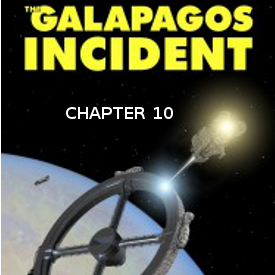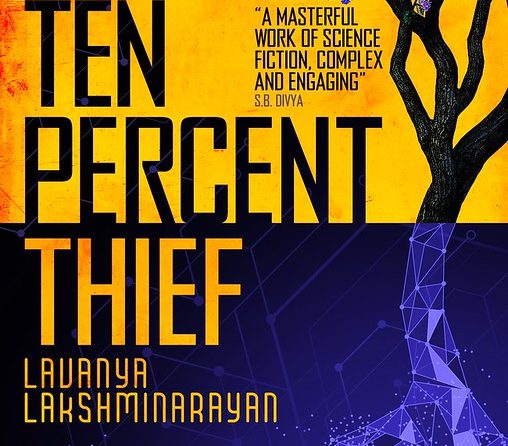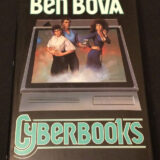
The rep from Zocalo, I think she called herself Kayla, wanted to discuss our son’s future. Conor just graduated high school, class of 2039, and hoped to become part of Zocalo, a process Kayla described as “transitioning.” She appeared on our old laptop across from us at the kitchen table providing ample detail on the procedure, but little context.
“So,” I tried to distill the past ninety minutes, “Conor wants to live online?”
“Zocalo is a simulation, a unique world as fully realized as our own.” The lack of condescension in her tone was itself condescending.
“I see.” I took a swig of coffee already room temperature.
“Mrs. Dangelo?” Kayla asked.
Becky absently swiped pages on a digital tablet loaded with documentation while staring out the window. Our unit was small, but the kitchen had a view of the building’s courtyard. The fronds of a holographic palm tree waved slowly, caught in a virtual breeze. “What?” She finally responded.
“Any questions about the contract?” Kayla asked, adjusting her corporate chic T-shirt.
“More like objections.” Becky folded her arms. “I find the whole thing bizarre. When Conor talks about Zocalo, it’s like he’s joining a cult.”
“It’s a lot for him to process. Expect to see more changes as Conor gets closer to his transition date.” Kayla flashed a smile revealing tiny lines around her mouth. The effect was so overtly humanizing, I started to suspect she was a bot.
“How can you be sure he’s ready?” Becky probed.
“He passed all our evaluations by a healthy margin. Conor is a stable, well-adjusted young man. You shouldn’t worry about his suitability for this.” Kayla brought her hands together interlocking fingers. Definitely a bot.
“But it’s like he’s going out of his way to be difficult.” Becky glanced at me. “Paul?”
“She’s right,” I said. “He’s been brutal to live with these past few months.” It was no exaggeration that Conor barely made it through high school. It baffled me because all he had to do was throw on a pair of AR goggles and log into class, but any inquiries into his anemic attendance were met with vitriol.
“We call this ‘soiling the nest’. I know it’s not pleasant when your child acts out, but some part of him is poisoning your relationship on purpose. Think of it as a defense mechanism to make leaving easier. After his transition, I’m confident Conor will come back to loving and respecting you just like before.”
“Except he’s not coming back,” Becky fumed. “And it’s never going to be like before.”
“I don’t want you to feel pressured.” Kayla’s synthetic empathy was unbearable. “Take the weekend to think it over. Shall we speak again Monday morning?”
Becky was back to staring out the window. She was done negotiating our son’s future with a corporate avatar.
“We’ll talk to Conor,” I said.
“Fine. And please consider how lucky you are to be able to provide your son with such a gift. He’s going to be very happy at Zocalo. He’ll be in safe hands.” Her image was replaced by a logo.
I downed the last of my coffee, and then stared at the customized mug. It was swag Becky ordered during the era when I coached Conor’s team. A wraparound video showed nine-year-old Conor dribbling and posing with his soccer ball in an endless loop. “Wish I could just freeze him like this,” I said.
“I cannot believe this is legal.” Becky wasn’t feeling nostalgic.
“We could refuse to sign,” I suggested.
“How would that help?” Becky asked. “In two months, he’ll be eighteen and won’t even need our consent.”
“Well,” I sighed. “He can’t do anything without our money. We could force him to use it for college, not this virtual nonsense.”
“Will Conor think that’s fair?” Becky’s expression made it clear she was hoping for a less confrontational resolution.
“We’re his parents, don’t we get a say?”
“If we threaten him, he might resent us forever,” Becky said.
“He’ll resent us more if we let him ruin his life. Come on, do we really think the kid who nearly failed high school is ready for…” I swiped on the Zocalo tablet until I found the phrase, “‘hybridized consciousness’?”
“I just want my son to be happy and healthy.” She buried her head in her hands.
“Hey.” I leaned toward her. “We’ll figure this out.” I held her and she hugged me back, pushing her head against my chest.
The front door opened, then slammed shut. Conor’s heavy footsteps rattled the staircase as he went straight to his room. He must have known we were home, but our relationship had devolved to the point where he seldom acknowledged our presence. Becky closed her eyes and let out a long breath. “Please talk to him.”
I knocked on his door and waited a beat — he’d been in there less than a minute, so the risk of seeing something neither of us wanted me to see was low. I tried to turn the handle. Locked. “Conor?”
“What is it?”
“Please open the door.”
I heard a deep exhale of annoyed capitulation, and then the door finally swung open revealing Conor, our nearly eighteen-year-old with an impossibly thick head of brown hair and permanently sullen expression. His shirt was off, and I couldn’t help noticing how incredibly fit he’d become despite sporadic exercise. He was like a hulked version of his younger self, toned muscles, ripped abs, zero body fat. It pissed me off since at fifty, I hit the stim-gym every day just to keep my current weight. “What?” He said exasperated.
I gently pushed past him, stepping over half-consumed fast food containers and a VR game controller buried under dirty socks. I made space on a corner of the bed for myself. “I want to talk.”
After another histrionic sigh, he plopped down in the chair at his desk. “Okay?”
“We spoke to the Zocalo rep today about your contract.”
“Oh.” He perked up. “I didn’t know that was today. So did you guys sign?”
“That’s what I want to talk to you about.”
“You promised you’d sign, Dad.”
“Your mom and I think it’s such a life changing decision, maybe you should hold off.”
“Why?”
“You’re so young.”
“You never listen to me!” Conor slammed the desk setting off the animated commercial on a box of dim sum. He smashed the box on the wall silencing the jingle, leaving a streak of dipping sauce.
“Calm down. We’re just asking you to wait one year. Please don’t rush into this.”
“Do you even understand how transitioning works?”
“It’s like being uploaded, right?” I was aware I was waving my hands a bit too much. “You join the cloud.”
“It’s way more complicated, and age is definitely a factor. That’s why I can’t wait.”
“It sounds drastic, and we don’t want you to make a mistake.”
“I know what I’m doing. The older you get, the more brain plasticity you lose.” His comfort with these concepts was impressive, although I questioned whether he understood or merely parroted what he’d heard. “Brain plasticity is key to making a full transition, but my window is shrinking. You guys just don’t get how fucked my life will be if I miss this chance.”
“I get it, okay; I mean, we do presentations on Zocalo, so I’m no stranger to it.”
“You only use the analog sections that’s like a glorified video conference, not even one percent of the platform’s potential. I’m going to exist inside Zocalo. My consciousness will transition, and I’ll interact with other transitioned people communicating in lines of code.”
“Uh-huh. Did I tell you about my old colleague from the bank? Vera Martinez? Vera got chipped last year and she’s on Zocalo like six hours a day, so I have a general idea of what you’re talking about.”
“It’s not the same.” Conor looked at me the way I’d looked at my father twenty years ago, trying to explain gender neutral pronouns.
“Well, it definitely changed her, and I’m not sure for the better. Since getting chipped, she stopped hanging out with anyone from work. Can’t remember the last time she joined us for lunch.”
“Maybe it’s harder for her to relate to people who haven’t been chipped, but she’s still just human language native with a machine interface. Her mind is still bogged down by meatware.”
“Gross.” It gave me a chill remembering the scar on Vera’s scalp visible for months before her hair grew back.
“Dad, try to understand, I’ll gain crazy processing power. I keep what’s in here now,” Conor tapped his head. “But my quality of thought will improve by multiples. That’s why all the best jobs are on Zocalo. I really don’t have options.”
“You always have options.”
“Like what?”
I interlocked my hands for effect. “Your mother and I think you should reconsider college.”
“Great idea! I could go to community college or whatever shit school is available for analogs, lose years of precious neural plasticity, and look forward to a career maintaining servers in a windowless data center until that job gets automated.”
“A little dramatic, I mean if you lose a job to automation, you’ll get universal basic.”
“No offense dad, but I’m not some over-the-hill millennial looking to ride out his best years in a dead-end career.”
I can’t pretend this didn’t sting. I knew Conor was aware I’d been let go of my job as Vice President of Compliance at the bank ten years ago, enforcing protocols company wide. The only work I found since was consulting to local agencies, writing guidelines for someone else to manage. I didn’t realize Conor was tracking my slow-motion career spiral. I thought I’d come to terms with it, but it’s pretty raw hearing your son describe your life’s work as a failure.
“I’m sorry, dad. I didn’t mean it. I just want to be smart enough to solve real problems like engineering seawalls and protecting glaciers. I gotta make my life mean something.”
“You think you can save glaciers?” This is when I should have stopped talking. “After getting a D in Chemistry, barely cracking a book senior year and spending all night playing holo vids?”
“Did you even look at my evals? My neural feedback results were insane. I’m a great candidate for this.”
“Well, you’re going to find it hard without the money from your college fund.”
This stunned Conor. We both realized I’d crossed an invisible boundary. A line I’d approached once or twice on my worst days as a coach, screaming from the sideline at a nine-year-old boy. But I was desperate to regain control over my son.
He took a deep breath. “I need that money to pay for the transition.”
“We think it’s best.” There was no backing down now.
“But it’s my future.”
“Just wait a year.”
“Dad.” Conor was breathing hard now. “Please.”
“We want what is best for you, and we believe that means taking time to consider what is an enormous and irreversible decision.”
“You said a million times I’m lucky my parents are ‘in a position to help’.”
“And I meant it, but I never said it was a blank check.” I felt despair hooking claws into my gut when I realized the most precious relationship in my life had become transactional.
“You get to decide everything because you have the money, right?”
“That’s not fair,” I pleaded.
“No, it isn’t.” It was clear Conor was calculating his next move.
“I just want to help you make the right decision.”
“Screw this!” Conor sprang up, grabbed a shirt without slowing on his way out the door.
“Conor!” I called after him. “Wait!” By the time I’d pushed off the bed and stumbled out of the bedroom, Conor’s long strides carried him downstairs and out the front door. He slammed it so hard, every window shook.
After our blowup, Conor never set foot in the house again. We begged him to come home, but he barely spoke to us. One of his friends’ parents, whose own son transitioned the year before, let Conor crash at their place. Becky and I tried to visit, but these folks were surprisingly, annoyingly protective of Conor’s “rights.” On the few chances we did get to speak, the conversation was entirely about money. Conor implored us to pay the Zocalo transition fee, but we held firm. I knew Conor was making a mistake, and that he just needed time to reconsider.
In the end, it didn’t even matter because when Conor told the rep about our unwillingness to pay, Zocalo offered to finance it for him. I guess we hadn’t realized how strong a candidate he really was. We lost touch with our son for several months after that. Once your kid starts the transition to Zocalo, it becomes a whole different thing, and the company really doesn’t like parents poking around the sausage making.
Luckily, we still had tablets loaded with Zocalo’s corporate documents. I’m no software expert, lines of code make my eyes glaze, but after three decades designing administrative processes for big institutions, there is no bureaucracy I can’t hack. So, I got to work. I dug deep into the most arcane policies in Zocalo’s employee handbook and customer service protocols until I discovered a back door. In the end, it only took a single perfectly crafted email – an antiquated system they were required to maintain by law – containing key words guaranteeing HR guided our request to the right paper pusher who forced our old pal Kayla to let the Dangelos visit their boy.
It had been six months since we’d seen Conor when I steered our dusty electric compact to Zocalo headquarters. Becky sat beside me, her eyes darting all around as we passed the main gate and entered Zocalo’s corporate campus.
“Are you sure this is the right place?” Becky pointed at the unimpressive entrance as we approached Zocalo headquarters. The building had no windows and only a single metal access door.
“It’s mostly server farms in there.”
“And Conor, right?” Becky tapped the plastic container she had brought full of Conor’s favorite oatmeal and raisin cookies.
Before we reached it, the door opened, and Kayla appeared. Turns out, she was human after all.
“Kayla, great to see you!” My turn for synthetic charm.
“Paul, Becky.” Kayla was decidedly less cordial, cooperating under protest. “I know you have authorization for this visit, but I strongly suggest waiting until your son has completed his transition. You might find the process unsettling.”
Becky flashed a worried look.
“We want to see our son. Now.”
“Follow me.” Kayla held the door open and we entered. Kayla led us down an unremarkable hallway past rows of identical doors void of any numbers or labels. It felt like walking in a VR game. Every wall was white and spotless.
Finally, we arrived at an observation room with a glass partition. It reminded me vaguely of an old maternity ward separating parents from newborns. On the other side of the glass, an orderly wearing a lab coat, facemask and gloves wheeled in a fragile body.
“Conor.” Becky dropped the container.
“Son?” It was now clear why the company went to such lengths to keep the process hidden. Conor sat in the wheelchair; head shaved with a spider web of cabling attached to his skull. He was awake and smiled when he saw us. He seemed alert. But even through the baggy hospital gown, you could see he was emaciated. All that muscle mass from only a few months ago was gone. “What the hell have you done to him?” I started to feel nauseous, my field of vision narrowing.
“It’s okay.” Conor spoke to us from behind the glass. “I’m all right.”
“We’re taking our son home right now.” My face was getting so hot I thought it would combust.
“Mr. Dangelo, please calm down.” Kayla said. “Conor must remain in a clean room environment.”
“I want my son!”
“Dad! Stop it!” The machine on a cart next to Conor beeped. “You think you’re helping, but you’re not.”
“What’s happening to him?” Becky asked Kayla without taking her eyes off her son.
“Conor’s mind is being reproduced inside our data center,” Kayla waved to the rest of the windowless building which I imagined was crammed with blinking servers. “Mapping a person’s consciousness is a slow process, but he’s made good progress.”
“What is happening to your body?” Becky asked her son.
“Mom, I know this is hard, but when it’s all over, I won’t even need this anymore.” Conor pinched the skin on his bony arm.
“What is he talking about?” I turned to Kayla, my fists clenching. “What happens to his body?” I almost didn’t want to hear the answer.
“After Conor completes the transition, his biological body will no longer provide enough processing power to host his consciousness.” Kayla spoke as if reading a script. “We do offer indefinite cryogenic stasis if that’s what Conor wants. He will decide once he’s transitioned.”
“Does that mean this whole thing is reversible?” I asked hopefully.
“Dad, I’m gonna see this through.” The machine beeped again. It sounded benign, but it seemed to mean something to Conor. “I’ve been out too long.”
“What are you talking about?” I pounded the glass with my fist.
“I’m sorry, I gotta get back.”
“Your son is correct. Any time spent outside Zocalo merely prolongs the transition.”
“Fuck your transition.” It was getting hard to think straight.
“I love you.” Becky finally managed.
“I love you too, mom.” Conor smiled before turning his wheelchair to face me.
“Please,” I managed, “take care of yourself.”
“See you on the other side.” Conor nodded. The orderly who had been just outside the door on Conor’s side of the glass stepped in and wheeled Conor and the beeping machine back into the bowels of the facility.
“I’m afraid that’s all the time we can spare.” Kayla moved back toward the door.
I don’t even remember leaving the place.
First thing the next morning, I engaged a plaintiff attorney. It took her weeks of legal diligence and cost us a small fortune, but in the end, our counsel concluded we had no cause of action. The release Conor signed was ironclad, with case after case providing ample precedent. So at the end of his yearlong procedure, Conor Dangelo ceased being a biological individual and became a citizen of Zocalo.
The good news was that once he’d transitioned, we were allowed to “see” Conor again.
“Mom!” Conor appeared on our old laptop at the kitchen table, his avatar grinning.
“Conor!” Becky wiped a tear from the corner of her eye. We both knew this was a reproduction, but it sure looked and sounded like our boy. Not the emaciated one, but the healthy and happy version, complete with glistening skin and wavy brown locks.
“Dad, you look great!” I couldn’t remember Conor ever sounding so happy.
“You too! I mean how do you feel? Wait, do you feel?”
“Yes, I do! And I have good news. I’m in the top quartile of my transition class, which means I’ll have my pick of projects.” I’d learned a little more about the embedded economies within Zocalo, and basically, the faster and more creative Conor became, the more higher paying gigs he’d be given.
“What are you working on now?” I asked.
“Most of our projects assist human teams with data analysis. I’m supporting doctors in the Russian Arctic studying dormant viruses in permafrost. We’re curing the next pandemic before it even starts!” The way Conor said the word ‘human’ in describing something other than himself was unsettling, especially since we had somehow helped to create him.
“Honey, have you made friends there?” Becky touched the edge of the laptop.
“Oh, yeah, tons of friends! Everybody is so genuine. It’s much different meeting someone in a completely virtual context. No need for affectations or anxiety about appearances. You can just be yourself.”
I turned to Becky who was also smiling and laughing. A year’s worth of anxiety washed away. I could tell she was as confused as I was by all of this, but there was something about the mother/son bond that transcended physics. I’m not sure it was the same for fathers.
“Conor?”
“Yeah, Dad?”
“Have you decided what to do with your body?”
“I have.” Conor smiled. I could tell from his expression he knew we weren’t going to like his response. “Kayla explained to me how much energy is required to keep a single human body in cryostasis indefinitely. The impact on the environment just isn’t worth it. I’ve elected not to keep it.”
“Where is it?”
“To be honest, I didn’t even ask. Probably fertilizing crops somewhere.”
Part of me wanted to scream. Conor’s beautiful body was gone, and we didn’t even say goodbye. But another part of me realized the futility of our position as parents. It was Conor’s decision. From the moment he’d been born, I’d been tricking myself thinking I had any control.
“Listen,” he said smiling. “I want you guys to know, I heard everything you told me when we argued about me joining Zocalo. You guys nearly convinced me not to go through with this, but I’m glad I did. It’s a new world inside here.” While Conor described facets of his virtual existence, Becky took my hand and caressed it. The softness of her skin surprised me. How could I have forgotten how good it felt?
“Did you know we have sports?” Conor continued. “I’m joining a soccer team. Dad, I think all your coaching is going to pay off.”
I closed my eyes and felt the sun streaming into our tiny kitchen, warming my face. While Conor described his plans for the future, I tried to imagine that the sounds coming from the computer were not a simulation. That the excitement in Conor’s voice was generated by full breaths pumped by actual lungs given form by real lips.
I opened my eyes and found Conor grinning back at me.
“I’m proud of you,” I told my son.
END











2 Comments